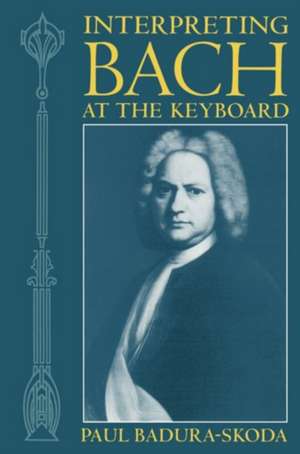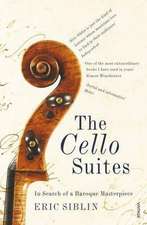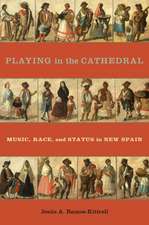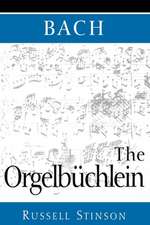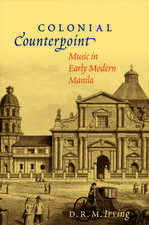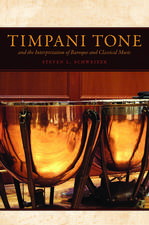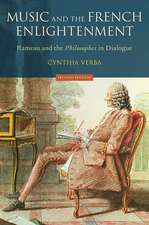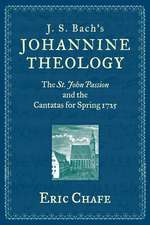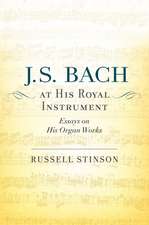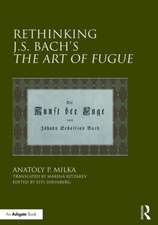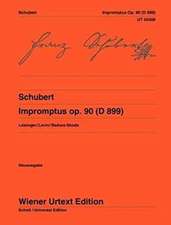Interpreting Bach at the Keyboard
Paul Badura-Skoda, Alfred Claytonen Limba Engleză Paperback – 22 iun 1995
Preț: 620.19 lei
Preț vechi: 874.09 lei
-29% Nou
Puncte Express: 930
Preț estimativ în valută:
118.71€ • 128.99$ • 99.78£
118.71€ • 128.99$ • 99.78£
Carte tipărită la comandă
Livrare economică 09-15 aprilie
Preluare comenzi: 021 569.72.76
Specificații
ISBN-13: 9780198165767
ISBN-10: 0198165765
Pagini: 592
Ilustrații: halftones, music examples, tables
Dimensiuni: 155 x 235 x 31 mm
Greutate: 0.92 kg
Ediția:Revised
Editura: Clarendon Press
Colecția Clarendon Press
Locul publicării:Oxford, United Kingdom
ISBN-10: 0198165765
Pagini: 592
Ilustrații: halftones, music examples, tables
Dimensiuni: 155 x 235 x 31 mm
Greutate: 0.92 kg
Ediția:Revised
Editura: Clarendon Press
Colecția Clarendon Press
Locul publicării:Oxford, United Kingdom
Recenzii
A splendid and valuable book - a fitting sibling to the author's classic work on the interpretation of Mozart. there is hardly an aspect of Bach interpretation not touched on, and scholarship is complemented by a lifetime's experience of performing the music under discussion.
its lack of a strenuously didactic tone, combined with deeply held artistic values, make the book a happy springboard to independent thought on the part of the reader. As such it should withstand the test of time, offering as much genuinely musical nourishment to the readers of 50 years hence as it does to those of today.
Once in a while there appears a book whose subject-matter, scope, thoroughness and readability all make its incorporation into even the smallest library a self-evident piece of evolution....I urgently recommend any perfromer who has not already acquired the hardback (1993) to buy this paperback forthwith...Badura-Skoda's prose style is lively, witty, well-paced...and always easy to follow. Considerable credit must accrue to translator Alfred Clayton, who not only preserves the elegance and flow of Badura-Skoda's original German, but even manages the jokes and puns too...a splendid achievement.If you play keyboard, go out and buy it instantly...Recommended without any reservations.
`it is a relief to turn to the passionate advocacy of Paul Badura-Skoda ... He wants to solve the mystery of Bach's appeal and to give pointers on how to convey it, and the vigour of the prose (congratulations also to the translator) gives a heady sense of the excitement of the unfolding detective story. ... but he is also able to present detailed evidence on specific issues and to lead the reader to some genuine insights by deeply thought-out arguments. Appreciating the importance of context he points the way to useful conclusions, marrying musicology with performance to produce a child which is understanding.'Gillian Weir
`The most comprehensive and authoritative treatment of its topic ever attempted. His intimate familiarity with Bach's keyboard music is evident throughout. This is an important study that deserves an international audience.'Russell Stinson, State University of New York
`This impressive book should be a welcome tool to evaluate and reassess what we have learned about Bach's keyboard style in recent decades.' Alfred Brendel
`I found many fascinating and rewarding pages in this very stimulating and unconventional book. For any lover of the 18th century, this study should be essential reading, not least because of its solemn final ending.' H. C. Robbins Landon
`[In] this big, detailed, and constantly worthwhile study ... a responsive, experienced performer and industrious reader of the literature shows us how he understands various of the problems for the interpreter of Bach's keyboard music; and the responses and experience of such a musician must be of great interest. The background work has beed well prepared, authorities are made use of as required, and there is an attractive impression given by the book of wishing to share ideas ... It is an imposing book, personal as opposed to remote, full of musical insights.' Peter Williams, Notes
'With a wealth of erudition which extends from the classical and rhetorical foundations of Renaissance culture in Europe to the theorists of the Postmodern, a rigorous approach to his subject matter, and boundless energy, Paul Julian Smith has produced a model of deconstructional criticism. Paul Julian Smith deals with difficult subject matter with integrity and in a style which is engaging and direct ... critical work of this standing deserve - and will undoubtedly gain - the attention of an academic readership beyond the confines of the study of the Hispanic world.'J.A. Drinkwater, University of Leeds, Journal of Gender Studies, Volume 1, Number 4, November 1992
an analytical excursion through several aspects of Bach's keyboard works: rhythm, tempo, articulation, dynamics, the sonorities of appropriate instruments, and ornamentation. The synthesis of these findings should contribute to expressive interpretations and clear renderings of larger musical structures that aim at the fulfillment of the composer's intentions. This exceedingly comprehensive work is particularly significant not only as a revelation of the musical perceptions of one of the foremost keyboard artists of our time, but also for the sound musicological evidence it presents. The author's demonstrated ability to convey the composer's intentions to present-day performers in the interests of mucial perfection undoubtedly will enrich the experience and understanding of Bach's music for audiences for many years to come.
its lack of a strenuously didactic tone, combined with deeply held artistic values, make the book a happy springboard to independent thought on the part of the reader. As such it should withstand the test of time, offering as much genuinely musical nourishment to the readers of 50 years hence as it does to those of today.
Once in a while there appears a book whose subject-matter, scope, thoroughness and readability all make its incorporation into even the smallest library a self-evident piece of evolution....I urgently recommend any perfromer who has not already acquired the hardback (1993) to buy this paperback forthwith...Badura-Skoda's prose style is lively, witty, well-paced...and always easy to follow. Considerable credit must accrue to translator Alfred Clayton, who not only preserves the elegance and flow of Badura-Skoda's original German, but even manages the jokes and puns too...a splendid achievement.If you play keyboard, go out and buy it instantly...Recommended without any reservations.
`it is a relief to turn to the passionate advocacy of Paul Badura-Skoda ... He wants to solve the mystery of Bach's appeal and to give pointers on how to convey it, and the vigour of the prose (congratulations also to the translator) gives a heady sense of the excitement of the unfolding detective story. ... but he is also able to present detailed evidence on specific issues and to lead the reader to some genuine insights by deeply thought-out arguments. Appreciating the importance of context he points the way to useful conclusions, marrying musicology with performance to produce a child which is understanding.'Gillian Weir
`The most comprehensive and authoritative treatment of its topic ever attempted. His intimate familiarity with Bach's keyboard music is evident throughout. This is an important study that deserves an international audience.'Russell Stinson, State University of New York
`This impressive book should be a welcome tool to evaluate and reassess what we have learned about Bach's keyboard style in recent decades.' Alfred Brendel
`I found many fascinating and rewarding pages in this very stimulating and unconventional book. For any lover of the 18th century, this study should be essential reading, not least because of its solemn final ending.' H. C. Robbins Landon
`[In] this big, detailed, and constantly worthwhile study ... a responsive, experienced performer and industrious reader of the literature shows us how he understands various of the problems for the interpreter of Bach's keyboard music; and the responses and experience of such a musician must be of great interest. The background work has beed well prepared, authorities are made use of as required, and there is an attractive impression given by the book of wishing to share ideas ... It is an imposing book, personal as opposed to remote, full of musical insights.' Peter Williams, Notes
'With a wealth of erudition which extends from the classical and rhetorical foundations of Renaissance culture in Europe to the theorists of the Postmodern, a rigorous approach to his subject matter, and boundless energy, Paul Julian Smith has produced a model of deconstructional criticism. Paul Julian Smith deals with difficult subject matter with integrity and in a style which is engaging and direct ... critical work of this standing deserve - and will undoubtedly gain - the attention of an academic readership beyond the confines of the study of the Hispanic world.'J.A. Drinkwater, University of Leeds, Journal of Gender Studies, Volume 1, Number 4, November 1992
an analytical excursion through several aspects of Bach's keyboard works: rhythm, tempo, articulation, dynamics, the sonorities of appropriate instruments, and ornamentation. The synthesis of these findings should contribute to expressive interpretations and clear renderings of larger musical structures that aim at the fulfillment of the composer's intentions. This exceedingly comprehensive work is particularly significant not only as a revelation of the musical perceptions of one of the foremost keyboard artists of our time, but also for the sound musicological evidence it presents. The author's demonstrated ability to convey the composer's intentions to present-day performers in the interests of mucial perfection undoubtedly will enrich the experience and understanding of Bach's music for audiences for many years to come.
Notă biografică
Professor Paul Badura-Skoda is a pianist and scholar.
